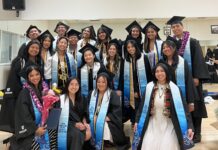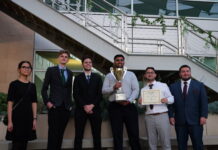Alleged Los Angeles (LA) Times salesman caught several University of California, Riverside (UCR) students’ attention from May 29-30, 2024 with supposed life-long student subscriptions for various news outlets, including the LA Times, as well as the San Diego Union Tribune and Press Enterprise, who they claimed to be working in collaboration with.
Administration, after learning about the interactions taking place, stated that solicitations in situations like this are “not allowed on campus without specific individual approval” and dispatched the University of California, Police Department (UCPD). UCPD then advised the group of the approval process that must be undertaken to solicit on campus, and the individuals departed campus shortly after.
In two separate red tents, three individuals claiming to be from the LA Times drew people into their deals with candy and persuasive sales pitches. These deals included subscriptions that were supposedly “life-time” and included three different package deals, ranging from $44-68 dollars, and contained subscriptions for papers such as the LA Times, Press Enterprise and San Diego Union Tribune.
What lured students into the offer the most was the cash-back deal, where after buying from these “salesmen,” students would then be reimbursed with $50 to $70 back in cash. To be eligible, students were asked to write their personal information, including their names, credit card information and mailing addresses, either on a physical piece of paper or online website; the salesmen would then finish the rest of the transaction for them.
One of the plans that the salesmen offered was a package deal including a Press Enterprise subscription which was individually marketed at $20. Upon further inspection of receipts, it was found out this deal was not “life-time” but rather included Sunday physical prints and unlimited online access for eight weeks. After collecting information about the deal that the salesmen were offering as well as their supposed identities, The Highlander contacted the Press Enterprise to confirm the validity of the offer. In response, the Press Enterprise explained that the specific Press Enterprise subscription is no longer being offered and confirmed that the salesmen had no affiliation with them and that they were “telemarketers.”
According to activity calls provided by UCPD, three calls were made regarding the solicitors. The first contact occurred on May 29 around noon, where the report summarized that “contact [was] made, credentials [of the salesmen] appeared legitimate to the officer,” and the solicitors were allowed to remain on campus for the remainder of the day. Final contact occurred on May 30 around noon, and “UCPD advised solicitors of [the] permitting process and directed [them] off campus.”
The policy cited by the administration and UCPD in this exchange is UCR’s “Commercial Activities/Advertising/Soliciting” policy. According to the policy, under “Sales of Goods and Services,” “University regulations prohibit individuals, organizations, or firms from conducting sales of any sort, including food sales, on University property,” with few exceptions, and those exceptions require prior approval.
Administration was also made aware of the situation, including Assistant Dean of Students and Director, Highlander Union Building, Brendan O’Brien, and Vice Chancellor for Planning, Budget & Administration Gerard Bomotti. At the moment, there is no specific way for students to verify whether solicitors on campus have been approved to sell commercial goods.
Detailing what the University could do to handle situations like these in the future, O’Brien plans to connect with Student Life during the summer for “[organization] training or even in the future with orientation” so they can share how these situations arise on a public campus, and make students better aware of these kinds of unsolicited interactions.
O’Brien also advised students that if they felt uncomfortable when seeing or experiencing these situations, that they “contact [the] University police or the dean of students office for assistance.” He stressed that “there are ways that the University [can] mitigate some of these [situations], but we only know what we know. So it’s the reporting [from students] that’s critical.”
Offering advice when it comes to financial interactions, O’Brien recommends students to “be mindful of when and how you’re giving away your information, especially when it comes to your [finances]. I think that’s a general rule of thumb.”








